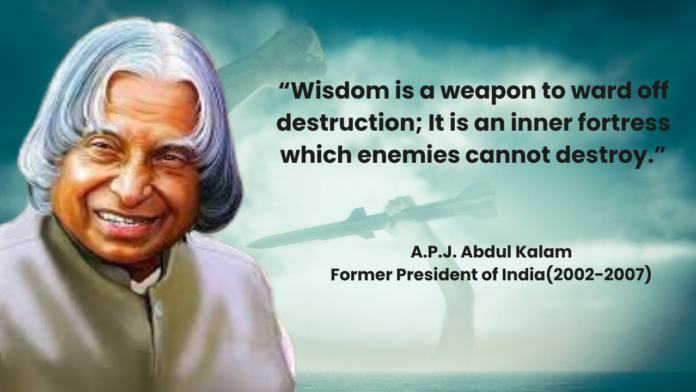On 15th October 1931, in the coastal town of Rameswaram, India, a boy named Avul Pakir Jainulabdeen Abdul Kalam was born into a humble background. From those modest beginnings, Dr. Kalam rose to become one of India’s most revered scientists, statesmen, and educators. Known as the “Missile Man of India” for his pivotal role in advancing India’s space and defense programs, Dr. Kalam’s influence extended beyond science and technology to the realms of business, entrepreneurship, and social upliftment.
Dr. Kalam’s life and work have been celebrated widely for their impact on India’s defense capabilities, but his contributions to the business world, especially through his advocacy for innovation, technology, and youth entrepreneurship, have been equally profound. As India honors his legacy each year on his birthday, his ideas continue to shape the country’s entrepreneurial landscape and inspire new generations of leaders.
Promotion of Technology and Innovation
Dr. Kalam’s greatest influence on the business ecosystem stemmed from his leadership in India’s defense and space programs. As a scientist at the Defence Research and Development Organisation (DRDO) and later as the project director at the Indian Space Research Organisation (ISRO), Kalam played a crucial role in the development of satellite and missile technologies. These achievements significantly bolstered India’s indigenous manufacturing capabilities, creating business opportunities for industries involved in aerospace, defense, and high-tech manufacturing.
Kalam believed that advancements in technology and innovation should serve as the backbone for national development. By encouraging partnerships between government research institutions and private industries, he helped foster an environment that led to the emergence of technology-driven businesses. His vision was clear: India should not merely be a consumer of global technologies but a creator of cutting-edge solutions that could solve national and global challenges.
Inspiration for Young Entrepreneurs
Dr. Kalam’s dedication to education and youth empowerment is a defining aspect of his legacy. Throughout his life, he was deeply committed to mentoring young minds, regularly engaging with students and young entrepreneurs. Kalam frequently addressed the importance of innovation-driven enterprises, particularly in his speeches and writings. He urged young people to challenge the status quo, embrace risks, and ask questions—because curiosity, he believed, was the foundation of entrepreneurship.
In one of his most famous addresses, he remarked, “Dream, dream, dream. Dreams transform into thoughts, and thoughts result in action.” His belief that India’s future lay in the hands of its young innovators resonated deeply across the nation, fostering a culture of entrepreneurship. His encouragement has led to a surge in startup activity in India, where many young entrepreneurs today continue to draw inspiration from Kalam’s vision.
Vision for a Knowledge Economy
Dr. Kalam’s book, India 2020: A Vision for the New Millennium, written in collaboration with Y.S. Rajan, is a blueprint for India’s transformation into a developed nation. The book emphasizes the role of technology and knowledge-based industries in driving economic growth. Kalam envisaged India becoming a global knowledge superpower, a vision that has found resonance in today’s booming information technology (IT), biotechnology, and renewable energy sectors.
By encouraging businesses to leverage intellectual capital and invest in research and development, Kalam helped lay the groundwork for India’s transition from a primarily agrarian economy to one fueled by technology and innovation. The explosive growth of India’s IT sector in the 1990s and beyond can be traced back to this vision, which emphasized self-reliance and technological leadership.
Encouragement of Social Entrepreneurship
Kalam’s ideas transcended pure business interests, advocating for a form of entrepreneurship that focused on social change and inclusive growth. He often spoke about the need for businesses to take on the responsibility of nation-building, emphasizing that success should not only be measured by profits but also by the positive impact on society.
His emphasis on social entrepreneurship is exemplified by his support for ventures that address pressing societal issues such as education, healthcare, and rural development. Kalam’s vision was rooted in the belief that entrepreneurship could be a powerful tool for alleviating poverty and bridging the gap between urban and rural India.
Initiatives for Rural Development
Dr. Kalam’s concept of PURA (Providing Urban Amenities to Rural Areas) was a revolutionary idea aimed at promoting rural entrepreneurship. Through PURA, he envisioned a strategy where technology, infrastructure, and business opportunities would converge to empower rural populations. The goal was to create sustainable economic development in India’s villages by providing the same amenities available in urban areas.
By advocating for technology-driven entrepreneurship in rural regions, Kalam sought to tap into the untapped potential of India’s vast rural population. This concept continues to influence rural development policies and has been instrumental in encouraging businesses to expand their operations into non-urban areas, promoting balanced economic growth.
Mentorship and Inspiration
Beyond his scientific and technological contributions, Dr. Kalam served as a mentor to numerous entrepreneurs and business leaders. His humility, resilience, and ethical leadership set an example for people from all walks of life. His ability to inspire through his words and actions encouraged many to pursue careers in innovation and entrepreneurship with a focus on ethical values and nation-building.
In one of his well-known quotes, Kalam stated, “A leader should know how to manage failure.” This emphasis on perseverance and learning from failure has become a mantra for many entrepreneurs navigating the complexities of starting and scaling businesses.
Conclusion
As India commemorates Dr. APJ Abdul Kalam on his birthday, his legacy as a visionary leader continues to shape the country’s business ecosystem. From promoting technological innovation to inspiring youth entrepreneurship, Kalam’s contributions have left an indelible mark on India’s journey toward becoming a global economic powerhouse. His unwavering belief in the power of dreams, combined with his practical approach to development, continues to motivate businesses to innovate, grow, and contribute to societal progress.
In many ways, Kalam’s vision for a self-reliant and knowledge-driven India is being realized today, as India’s startup ecosystem thrives on the values he championed—innovation, resilience, and a commitment to creating a better future for all.




